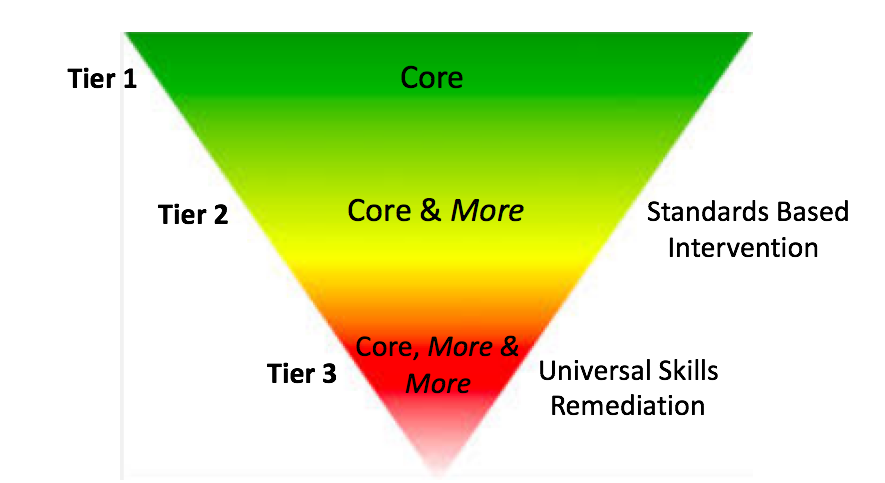Parent Guide to Multi-tiered System of Supports (MTSS)

Your child’s school is committed to providing high quality instruction and support to promote the highest achievement of all students. The Multi-Tiered System of Supports (MTSS) is a framework schools use to provide instruction and support that maximizes the success of all students. This brochure provides an overview of Multi-Tiered System of Supports for parents and answers common questions parents have about MTSS.
What is MTSS?
Multi-Tiered System of Supports (MTSS) is a framework for integrating levels (or tiers) of academic and behavior support to promote the success of all students. Sometimes referred to as RTI, or response to intervention, in Florida MTSS refers to the system of supports while RTI refers to how a student responds to instruction and intervention support. The ultimate goal of a MTSS is to provide high-quality instruction and degree of support each student needs to be successful. MTSS is not special program, class, or intervention, but rather a way of organizing instruction and intervention to help all students and promote early identification of students needing additional academic or behavioral support to be successful. MTSS is also be used to help identify students who may need special education.
What are the key components of a multi-tiered system of supports?
The key components of the multi-tiered system of supports (MTSS) are:
- High quality, research-based instruction in the general education setting
- Universal screening to identify students needing supplemental support (Tier 2 or Tier 3)
- Multiple tiers (levels) of instruction that are progressively more intense, based on the student’s response to instruction
- Evidence-based interventions matched to student need
- Ongoing progress monitoring of student performance (response to intervention)
In the multi-tiered system of supports, the progress of all students is monitored and instruction and intervention are provided in varying intensities (multiple tiers) based on student need.
What are tiered supports?
MTSS organizes instruction and intervention into tiers, which provide differing levels of supports:
Tier 1 – All students receive high quality, core academic and behavior instruction and supports.
Tier 2 – Students needing additional support receive more focused, targeted small group instruction/intervention and supports in addition to core academic and behavior curriculum and instruction.
Tier 3 – Individual students receive the most intense instruction based on individual student need in addition to core and supplemental academic and behavior, curriculum, instruction, and supports.

How does the school identify and support students?
Schools screen all students to identify students needing additional support. For student’s needing additional support, a school based-team (intervention or problem-solving team) uses a problem solving process to develop and implement evidence-based interventions and monitor student response (RTI). Team membership varies depending on the student’s needs but should include individuals with knowledge of the student, grade-level expectations, the problem-solving process, evidence-based academic and behavioral interventions, progress monitoring, and diagnostic assessment. A school team typically includes an administrator; school counselor; teacher; intervention specialist; school psychologist; school social worker. When developing intensive, individual supports, a team member, including the school psychologist, may administer individual diagnostic assessments to help plan the intervention. Problem-solving teams at the individual student level should always include the parents of the student.
What can I expect with MTSS?
- Early identification of academic or behavioral concerns
- Instruction and intervention support that is matched to my child’s academic or behavioral needs
- Involvement in data-based problem solving for my child
- Feedback on how my child is responding to targeted and individual interventions
- Information on my child’s progress in meeting grade-level standards/expectations
How does MTSS help inform whether my child may need special education?
The screening and progress monitoring components of MTSS identify students who need additional support to experience success. The problem solving process will help identify the nature of your child’s learning difficulties, the specific intervention and supports to implement, and the intensity of support needed to improve outcomes and sustain growth. The school team discovers what works for a student through the ongoing process of problem solving and monitoring response to intervention. Your child’s response to instruction and to intensive, evidence-based interventions will help determine whether they may need specialized instruction.
- If your child does not make adequate progress after they have received effective core instruction and intensive, evidence-based interventions, the team should consider whether he or she may be a student with a disability who needs specialized instruction.
- If your child is making adequate progress with intensive intervention support, but their progress can only be maintained by providing and sustaining a high level of support over time, this may also be an indicator that your child may need specialized instruction. Your child does not have to fail to need special education if their success is dependent on intensive services sustained across time.
- Your child’s response to intervention is one indicator of potential need for special education; however, just because a student is not meeting grade level expectations or is receiving intensive intervention support does not necessarily mean they are a student with a disability or need special education.
What if I think my child needs special education?
Parents can request an evaluation for special education at any time. The request may be written or verbal, but it is important the date the request was made and the person to whom it was given be you documented. Communicate your request to the school counselor, ESE coordinator, or administrator at your child’s school; or to the district Exceptional Student Education (ESE) office.
In order to receive special education services, a student must qualify for one of thirteen IDEA eligibility categories AND because of the disability, need specially designed instruction. Not all students with a diagnosis need special education services. Information on IDEA disability categories and eligibility criteria, visit the Florida Department of Education’s Bureau of Exceptional Education and Student Services website at https://www.fldoe.org/academics/exceptional-student-edu/ese-eligibility/
What happens after I request an evaluation?
The school (or district) must respond to your request for an evaluation within 30 calendar days by one of the following:
1. Obtain your written permission to conduct the evaluation. The district cannot conduct a special education evaluation without your written consent. Prior to obtaining your written consent, the school team should discuss the evaluation procedures that they are proposing to conduct with you, so that you are fully informed about the evaluation procedures that will be included. The school has 60 calendar days, with exceptions for vacations and holidays, to complete the evaluation.
2. Provide a formal, written refusal with an explanation for the refusal.
The school (or district) should also provide you with a copy and explanation of your procedural safeguards when they respond to your request.
What if my school tells me that they cannot initiate an evaluation until the RtI “process” is completed?
Parents can request an evaluation for special education at any time regardless of the level of tiered support your child is currently receiving. The Office of Special Education Programs (OSEP) clarified in a January 21, 2011 memo, that response to intervention cannot be used to deny or delay an evaluation. The school has 30 days to respond to your request. Unless the school provides a written notice of refusal, the school must provide you with the opportunity to provide consent for the evaluation within 30 days. If an evaluation is initiated, the response to intervention data required for eligibility is collected during the 60-day evaluation period.
Where else can I find information on MTSS?
- Guiding Tools for Instruction Problem Solving
- RTI Action Network – Resources for Parents and Families
Who can I contact for information on MTSS at my child’s school?
For more information on MTSS at your child’s school, contact the school administrator or school counselor.








